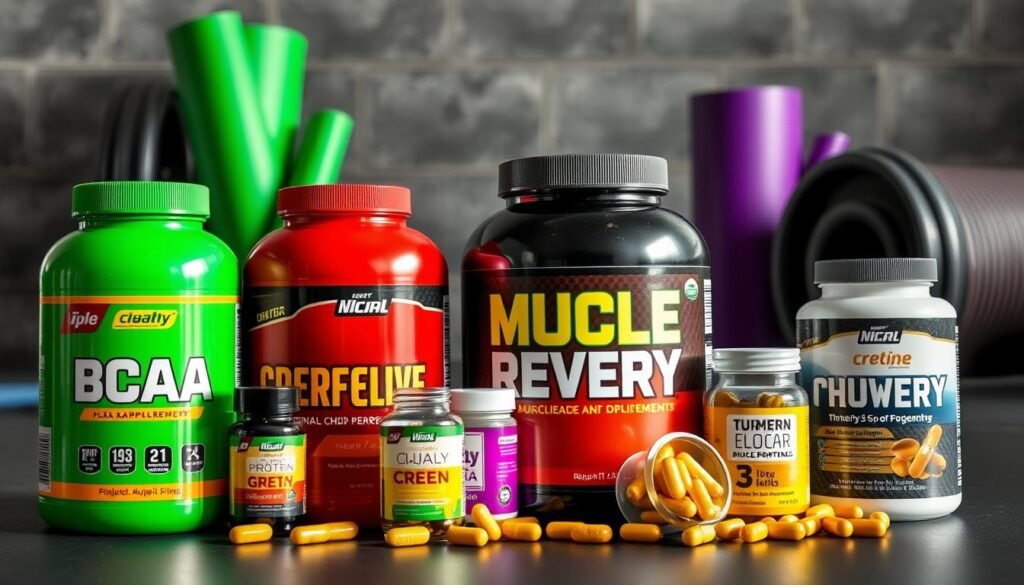About 50% of people in the U.S. don’t get enough magnesium. This shows how crucial proper nutrition and supplements are. They help keep muscles healthy and fight off tiredness. Both athletes and everyday gym-goers face muscle fatigue and soreness. This can slow down their performance and recovery. Thankfully, certain supplements greatly improve muscle recovery and ease soreness. They are key for anyone wanting to get the most from their exercise routine.
Here, we’ll look into different supplements for muscle recovery. A balanced approach is key. This includes eating right, staying active, and getting enough sleep for the best muscle health. Knowing how these supplements can cut down recovery time and boost energy is important. It helps you choose wisely. For deeper insights into exercise and athletic performance supplements, check out this thorough guide on exercise supplements.
Key Takeaways
- Supplements for muscle fatigue and soreness play a crucial role in enhancing recovery.
- Magnesium and iron deficiencies can significantly impact energy levels and athletic performance.
- Proper nutrition complements the effects of muscle recovery supplements effectively.
- Consulting healthcare professionals is advisable before beginning any supplement regimen.
- Understanding individual nutrition needs, like Vitamin B12 for vegans, is essential for optimal performance.
Understanding Muscle Fatigue
Muscle fatigue can really affect how we perform physically every day. It’s crucial to know what causes it and how it shows up. This knowledge helps in recovering properly and keeping healthy.
Definition and Causes of Muscle Fatigue
Muscle fatigue happens when muscles get weaker after a lot of exercise. There are many reasons for muscle fatigue. These include:
- Exercising for a long time without enough rest
- Lactic acid building up during intense workouts
- Chronic fatigue syndrome, affecting about half of those diagnosed
- Fibromyalgia, where 70% of people say they feel very tired
- Getting older, especially after 40
- Not drinking enough water, which can lower how well muscles work by 30%
Symptoms of Muscle Fatigue
It’s important to recognize the symptoms of muscle fatigue. Some main ones are:
- Feeling tired more than usual
- Having trouble focusing
- Muscle weakness, as seen in diseases like myasthenia gravis
- Often getting headaches and wanting to sleep more
- Muscle cramps, which affect almost 60% of adults during exercise
Knowing these signs helps in finding ways to get better. Drinking enough, eating well, and exercising right are key. They greatly help in fighting off muscle fatigue.
Importance of Recovery in Muscle Building
Getting better at sports and growing muscles depends a lot on muscle recovery. Recovery helps fix small muscle tears from intense workouts. It also greatly affects how well you’ll perform later.
How Muscle Recovery Affects Performance
Research shows that muscle damage from exercise really lowers how much work you can do. This is key for athletes wanting to be at their best. Giving muscles time to recover boosts strength and stamina.
Not focusing on recovery can make you constantly tired, perform worse, and get hurt more easily.
Role of Nutrition in Muscle Recovery
Eating right is crucial for better recovery. Having carbs and proteins right after working out refills energy and repairs muscles. A 3-to-1 carbs to protein ratio is recommended for good results.
Athletes should also look into specifics like protein needs or using BCAAs after exercising. These methods greatly help with recovery. This lets athletes push harder and reach their goals.
Custom nutritional strategies are essential. They help athletes recover well and perform better.

Top Rated Muscle Recovery Supplements
Choosing the right supplements is crucial for enhancing muscle recovery. Athletes and fitness enthusiasts often look for the best ones. Protein supplements and branched-chain amino acids (BCAAs) are highly favored. They help in recovery, reduce soreness, and boost performance.
Protein Supplements and Their Benefits
Among fitness circles, whey protein stands out. It provides a high amount of essential amino acids. These are key for rebuilding muscles after tough workouts. Adults need about 0.8 g/kg/day of protein. But, athletes might need up to 2 g/kg.
For those over 65, up to 1.2 g/kg of protein is recommended. Adding protein supplements post-workout can greatly aid recovery.
Branched-Chain Amino Acids (BCAAs) for Recovery
BCAAs are known for their role in reducing soreness and fatigue after exercise. Leucine, isoleucine, and valine aid in muscle building and energy. Studies reveal BCAAs lower soreness if taken before exercise. They also speed up recovery time.
BCAAs also help keep muscle mass during low-calorie diets. This makes them essential for any training plan.
Exploring Natural Remedies for Muscle Fatigue
Natural remedies for muscle fatigue can improve recovery and well-being. With herbal options and diet changes, you can fight fatigue and help muscles recover. This means a healthier, more energetic you.
Herbal Options for Reducing Fatigue
Herbal remedies are becoming popular for fighting low energy. Ashwagandha, for example, helps your body handle stress and fatigue better. Turmeric, with curcumin, fights inflammation and pain. This aids in a quicker recovery. Adding these herbs to your daily routine can offer natural relief.
Dietary Changes to Support Muscle Recovery
Good nutrition is vital for recovery. Eating foods like leafy greens, lean proteins, and whole grains gives you key nutrients. These help fix damaged muscles. Staying hydrated is also crucial for your muscles to work best. Even a little dehydration can hinder your performance and healing.
Adding foods like bananas, which have lots of potassium, helps avoid muscle cramps. Oatmeal is great, too. It gives you carbs and protein for muscle repair. These foods promote healthy muscles and recovery.
| Food | Benefits |
|---|---|
| Bananas | Rich in potassium; Helps prevent muscle cramps |
| Turmeric | Reduces inflammation; Enhances recovery |
| Oatmeal | Quick energy source; Supports muscle repair |
| Leafy Greens | Packed with vitamins; Aid in muscle health |
| Ashwagandha | Reduces fatigue; Boosts energy levels |

Adding natural remedies to your daily life eases muscle fatigue and supports a healthy lifestyle. For more tips on using herbs to boost energy, visit this resource.
Popular Supplements for Muscle Fatigue and Soreness
Muscle fatigue and soreness can really affect your workout results. Iron, magnesium, and creatine are key to recovery. Adding these supplements to your routine may help your muscles recover and perform better.
Iron and Its Role in Energy Production
Iron plays a big part in making energy. It helps move oxygen in your blood. If you have enough iron, you’ll have more energy and better endurance. Iron benefits also include supporting muscle function. This is crucial for those who work out hard. It’s important to get the right amount of iron to keep up your performance and health.
Benefits of Magnesium for Muscle Health
Magnesium is important for your muscles. It helps them relax and reduces cramps after workouts. It also helps with energy and keeps muscles healthy. A good way to get it is Thorne Research’s Calcium-Magnesium Malate. This product makes it easy to get your magnesium.
Creatine: Fuel for Muscle Recovery
Creatine is known for helping muscles recover and perform better. It helps build muscle after intense workouts. Taking creatine with carbs after you work out can help your muscles use it better. Regularly using it can lessen soreness and speed up recovery. That’s why many athletes include it in their regimen.

| Supplement | Key Benefits | Recommended Dosage |
|---|---|---|
| Iron | Energy production, oxygen transport | Varies; consult a healthcare professional |
| Magnesium | Muscle relaxation, cramp reduction | Daily intake with meals for optimal absorption |
| Creatine | Improved muscle recovery, reduced soreness | Post-workout with carbs for enhanced uptake |
These supplements can really help with muscle fatigue. It helps to know how iron, magnesium, and creatine help with recovery. While current research backs up their benefits, more studies are needed to understand them fully.
Looking for more on recovery? Check out this resource on the role of nutrition in recovery.
Supplements for Post-Workout Recovery
Post-workout recovery aids are key for muscle repair and cutting down on tiredness. They can boost your training results. Coenzyme Q10 and ashwagandha stand out for their health perks.
Coenzyme Q10 and Its Impact on Energy
Coenzyme Q10 is known for its strong antioxidant effect. It helps make more energy in your cells. If you work out hard, Coenzyme Q10 can make your performance better.
Studies have shown it’s linked to better muscle growth by raising NAD+ levels. Without enough of it, muscle health and recovery suffer.
Ashwagandha for Reducing Stress and Fatigue
Ashwagandha helps fight stress and fatigue after working out. This adaptogen makes recovery better by lowering stress. Lowering stress after a workout is key for better muscle repair.
Adding these supplements to your routine boosts your training outcomes. Remember, rest, food, and water also play a big role. They help you reach your top performance level.
Muscle Soreness Relief Supplements
Muscle soreness can get in the way of your best performance and health. Luckily, there are muscle soreness relief supplements that look promising. Tart cherry juice extract and turmeric are standout choices for easing soreness and inflammation.
Tart Cherry Juice Extract for Reduced Inflammation
Tart cherry juice is famous for its antioxidants, like anthocyanins, which fight inflammation. Studies show that tart cherry juice extract can lessen muscle soreness after hard workouts. Athletes using tart cherry juice say they feel less pain and recover faster.
Turmeric’s Anti-Inflammatory Properties
Turmeric, with its active part curcumin, offers strong anti-inflammatory help. This can ease muscle soreness. Using turmeric daily has shown to ease soreness and help recovery. This regular use could boost muscle function and lower exercise-related aches.
| Supplement | Primary Benefit | Recommended Dosage |
|---|---|---|
| Tart Cherry Juice Extract | Reduces Muscle Soreness | 8-12 ounces daily |
| Curcumin (Turmeric) | Alleviates Inflammation | 500-2,000 mg daily |
These supplements offer natural ways to recover faster. The evidence for their effectiveness is strong. They are good choices for anyone feeling sore after workouts.
Choosing the Best Supplements for Muscle Recovery and Repair
Choosing the right supplements for muscle recovery is key. It needs a careful look at health goals and what you eat. Knowing the factors in supplement selection is crucial to success.
Factors to Consider When Selecting Supplements
There are several things to consider when picking recovery supplements:
- Ingredient Profile: Check the ingredients for their effectiveness. Important ones include quality protein, carbohydrates, and vitamins for recovery.
- Doses: Know the best amounts, like 20 to 25 grams of protein, for muscle repair.
- Potential Interactions: Think about how supplements might affect your current medicines and health.
- Dietary Restrictions: Make sure your supplements fit your dietary needs to prevent bad reactions.
Consulting a Healthcare Professional
Talking to a healthcare professional before starting supplements is key. This helps you choose safely, avoiding unwanted effects. A doctor can suggest what’s best for you, looking at your health, how active you are, and what you eat.
Conclusion
The path to effective muscle recovery involves a mix of supplements. Studies suggest protein supplements help muscle performance. Yet, more research is needed to prove they reduce soreness after workouts. Despite this, 27 studies show protein’s benefits, though results vary. It shows the need to mix supplements with other recovery methods.
Magnesium is also crucial for people who work out hard. They might need 10-20% more magnesium to help their muscles. Curcumin, with its anti-inflammatory benefits, also looks promising for recovery. These, along with a balanced plan, can improve recovery outcomes.
Choosing the right supplements can greatly improve your performance and lessen soreness. Adding a nutritious diet and enough rest to your recovery plan is essential. This comprehensive approach helps in achieving fitness goals and ensures lasting recovery results.